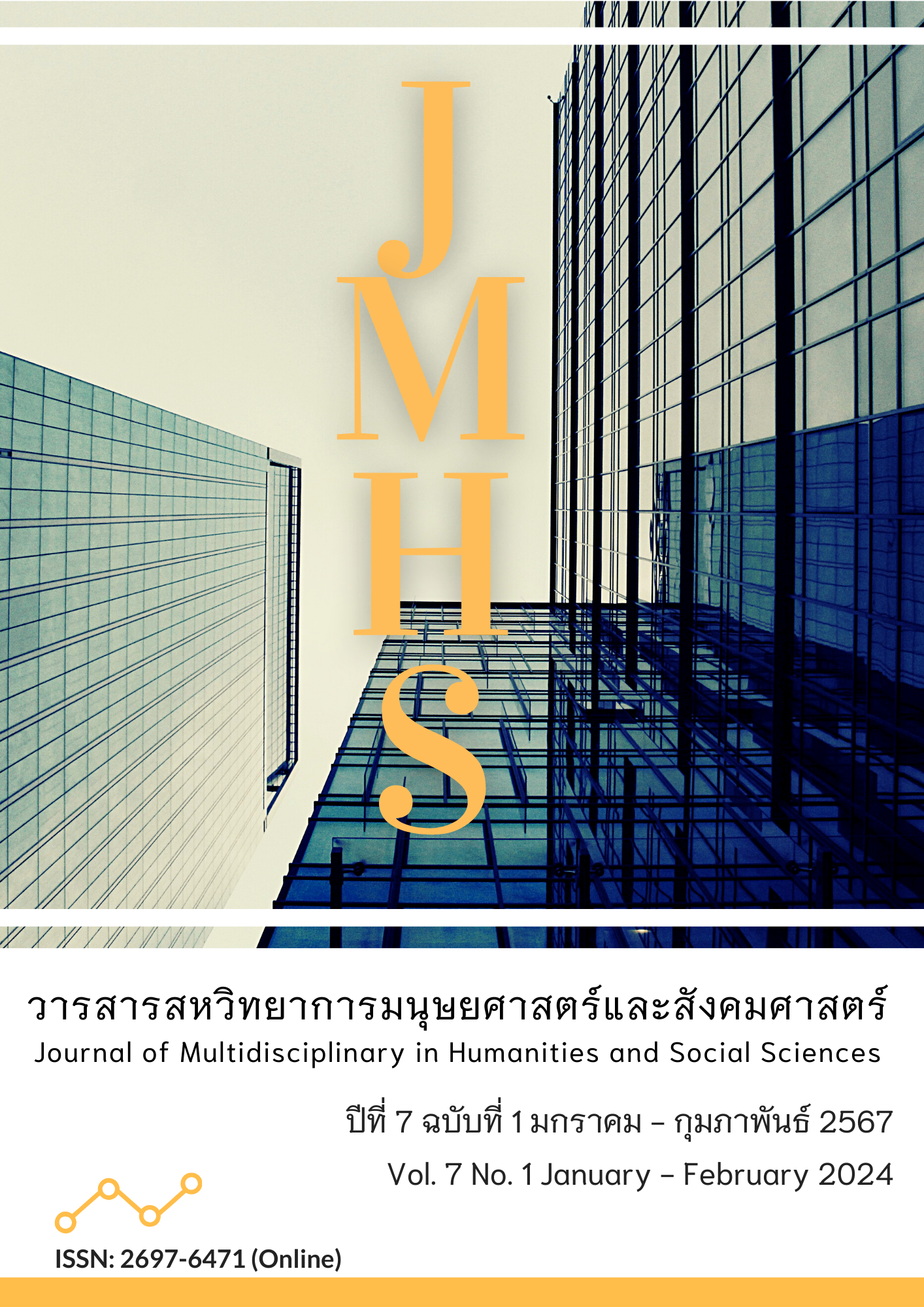Leadership of school administrators in the digital era
Main Article Content
Abstract
This article aimed 1) to identify the factors of the leadership of school administrators in the digital era and 2) to verify the factors of leadership of school administrators in the digital age. The research populations consisted of 20,740 school under elementary the office of the Basic Education Commission, Ministry of Education. The samples were 100 elementary schools. The sample size was determined based on Yamane’s Sample Size Table. The sample was obtained from stratified random sampling. There were 300 respondents including school directors, deputy directors of the school or heads of learning groups and teachers. The research instruments were the semi-structured interview, and the questionnaire of verify the research findings. The statistics used in data analyze the data were frequency, percentage, arithmetic mean, standard deviation, exploratory factor analysis, and content analysis. The research results were found as follows;
- Leadership of school administrators in the digital era consisted of six factors: 1) creating a digital corporate culture, 2) networking, 3) accepting change, 4) having technology skills, 5)developing people, and 6)having technology vision. The total variance explained by six components is389 percent.
- The factors of leadership of school administrators in the digital era to meet with accurate, propriety, feasibility, and utility.
The findings from this research are that administrators of educational institutions in the digital age must develop leadership by creating a digital organizational culture, creating networks to accept various changes, have technological skills, develop personnel, have technological vision, and develop new innovations. and use digital technology to drive the development of educational institutions into quality organizations.
Article Details

This work is licensed under a Creative Commons Attribution-NonCommercial-NoDerivatives 4.0 International License.
Views and opinions appearing in the Journal it is the responsibility of the author of the article, and does not constitute the view and responsibility of the editorial team.
References
จักรกฤษณ์ สิริริน. (2561). ภาวะผู้นำตัวใหม่ : ภาวะผู้นำ ICT. สืบค้นเมื่อ 18 มกราคม 2565, จาก https://www.facebook.com/EdInnoNews/posts/1642173849204991/
จิรพล สังข์โพธิ์, สุวรรณ จันทิวาสารกิจ และ เสาวนีย์ อยู่ดีรัมย์. (2564). ภาวะผู้นำในการบริหารองค์กรยุคดิจิทัล กรณีศึกษา: องค์กรไอทีและองค์กรที่เกี่ยวข้องกับไอทีในเขตกรุงเทพมหานครและปริมณฑล. กรุงเทพฯ: วิทยาลัยนวัตกรรม, มหาวิทยาลัยธรรมศาสตร์.
ชีวิน อ่อนละออ, สุชาติ บางวิเศษ, กานนท์ แสนเภา และ สวิตา อ่อนละออ. (2563). ภาวะผู้นำยุคดิจิทัลสำหรับนักบริหารการศึกษา. วารสารวิทยาลัยบัณฑิตเอเชีย, 10(1), 108-109.
ดาวรุวรรณ ถวิลการ และ ศิริญญา ภิญโญ. (2559). ภาวะผู้นำการสร้างองค์ความรู้สำหรับผู้บริหารและครูในศตวรรษที่ 21. วารสารบริหารการศึกษา มหาวิทยาลัยขอนแก่น, 12(2), 3-4.
ทิพย์วรรณ สุพิเพชร. (2566). นวัตกรรมการเรียนการสอนเพื่อการศึกษาในอนาคต. วารสารนวัตกรรมการจัดการศึกษาและการวิจัย, 5(2), 471–480. สืบค้นจาก https://so02.tci-thaijo.org/index.php/jemri/article/view/259673
ธีระ รุญเจริญ. (2557). ความเป็นมืออาชีพในการจัดและบริหารการศึกษายุคปฏิรูปการศึกษา. (พิมพ์ครั้งที่ 9). กรุงเทพฯ: ข้าวฟ่าง.
ปกรณ์ ลี้สกุล. (2561). ภาวะผู้นำในโลกดิจิทัล. สืบค้นเมื่อ 21 เมษายน 2565, จาก https://aommoney.com/leadership-in-digital-era-ภาวะผู้นำในโลกดิจิทัล/
ภคพร เลิกนอก. (2563). การบริหารสถานศึกษาในยุคดิจิทัล สำหรับผู้บริหารสถานศึกษาสังกัดสำนักงานเขตพื้นที่การศึกษาประถมศึกษาขอนแก่น เขต 4. วารสารบัณฑิตศึกษามหาจุฬาขอนแก่น, 7(2), 150-166. สืบค้นจาก https://so02.tci-thaijo.org/index.php/jg-mcukk/article /view/238743
รุ่งรัตน์ พลชัย. (2563). ภาวะผู้นำกับการบริหารในยุคดิจิทัล. วารสารมนุษยศาสตร์และสังคมศาสตร์ มมร.วิทยาเขตอีสาน, 1(3) 53-59. สืบค้นจาก http://ojs.mbu.ac.th/index.php/hsjs/article/view/1045
สงบ อินทรมณี. (2562). การบริหารสถานศึกษาในยุคดิจิทัล. วารสารวิชาการมหาวิทยาลัยการจัดการและเทคโนโลยีอีสเทิร์น, 16(1) 353-360. สืบค้นจาก https://so06.tci-thaijo.org/index.php/umt-poly/article/view/192507
สุกัญญา แช่มช้อย. (2558). ภาวะผู้นำทางเทคโนโลยี: การนำเทคโนโลยีสู่ห้องเรียนและโรงเรียนในศตวรรษที่ 21. วารสารศึกษาศาสตร์ มหาวิทยาลัยนเรศวร, 16(4), 216-224. สืบค้นจาก https://so06.tci-thaijo.org/index.php/edujournal_nu/article/view/43757
สุกัญญา แช่มช้อย. (2562). การบริหารสถานศึกษาในยุคดิจิทัล. (พิมพ์ครั้งที่ 2). กรุงเทพฯ: จุฬาลงกรณ์มหาวิทยาลัย.
อภิชัย พันธเสน และคณะ. (2560). การสังเคราะห์งานวิจัยว่าด้วยปัญหาและข้อเสนอแนะในการวางแผนจัดการศึกษาไทย : ประเด็นปัญหาคุณภาพการศึกษา 2535-2558. สืบค้นเมื่อ 25 มกราคม 2565, จาก https://knowledgefarm,tsri.or.th/educational-administration-problem/
เอกชัย กี่สุขพันธ์. (2559). การบริหารสถานศึกษายุคดิจิทัล. สืบค้นเมื่อ 19 พฤศจิกายน 2564, จาก https://www.trueplookpanya.com/knowledge/content/.
Best, J. W., & Kahn, J. V. (2006). Research in Education. (10th ed). Massachusetts: Pearson Education.
Comrey, A. L., & Lee, H. B. (1998). A First Course in Factor Analysis. (2nd ed). New York: Psychology Press.
Cortellazzo, L., Bruni, E., & Zampieri, R. (2019). The Role of Leadership in a Digitalized World: A Review. Frontiers in Psychology, 10, 1-21. https://doi.org/10.3389/fpsyg.2019.01938
Cronbach, L. J. (1984). Essentials of Psychological Tests. (4th ed). New York: Harper & Row.
Denning, S. (2021). How New Leadership Succeeds in the Digital Age. Retrieved February 18, 2022, from https://www.forbes.com/sites/stevedenning/
Hamill, J. (2019, June 2). From Digital Leadership to Leadership for a Digital Era. Retrieved March 13, 2022, from htts://www.linkedin.com/pulse/from-digital-leadership-era-jim-hamill-dr-.
Likert, R. (1961). The Human Organization. New York: McGraw-Hill.
Yamane, T. (1967). Statistics: An Introduction Analysis. (2nd ed.). New York: Harper & Row.
Young, H. (2020, May 14). 6 Things Education Administrators in the Digital Age Should Have and Apply. Retrieved January 6, 2022, from https://campus.campus-star.com/variety/142966.html.


